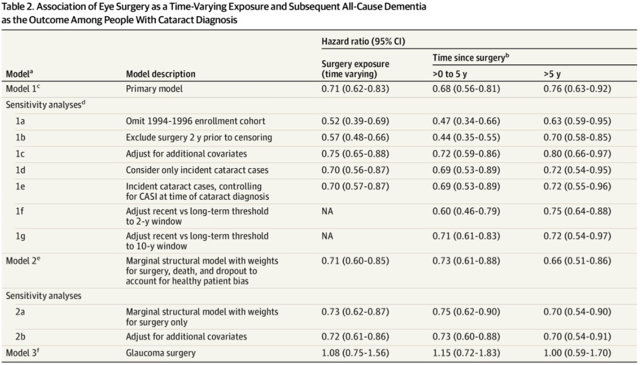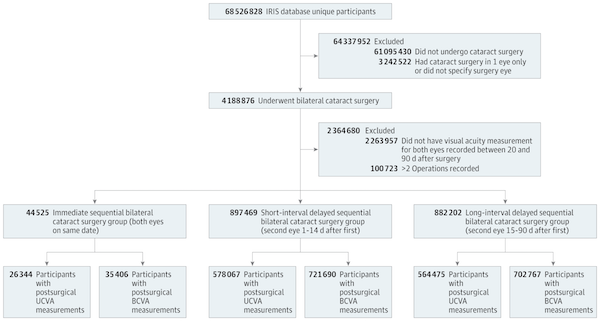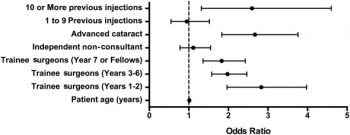In a new paper published in JAMA Internal Medicine, Dr. Cecilia Lee and her colleagues report exciting findings related to the association between cataract surgery and dementia risk. Using data from Adult Changes in Thought, an ongoing longitudinal study following 5000+ older adults for the development of Alzheimer disease and other dementias, they compared outcomes of participants with cataract who had surgery to those who did not. Participants who underwent cataract surgery had nearly 30% lower risk of developing dementia from any cause compared with those who did not, even after controlling for many health-related confounders and potential sources of biases.
Continue reading "Association Between Cataract Extraction and Development of Dementia"Refractive Outcomes After Immediate Sequential vs Delayed Sequential Bilateral Cataract Surgery
In this large population-based study using data from American Academy of Ophthalmology Intelligent Research in Sight (IRIS) Registry, Dr. Cecilia Lee and her co-authors looked at visual acuity outcomes after bilateral cataract surgery. Specifically, they compared outcomes after immediate sequential bilateral cataract surgery or ISBCS (patients undergo surgery for both eyes on the same day, as separate procedures), and delayed sequential cataract surgery or DSBCS (patients have the surgeries on separate days). ISBCS is less commonly performed in the United States, but is growing in popularity and may have some advantages such as fewer follow-up visits, immediate vision correction, and lower cost. However, many ophthalmologists prefer delaying the second surgery in order to assess vision after the first surgery, in order to make adjustments for the second eye.
Continue reading "Refractive Outcomes After Immediate Sequential vs Delayed Sequential Bilateral Cataract Surgery"Disparities in delivery of ophthalmic care; An exploration of public Medicare data.
In this interesting study, the authors examined the effect of geographic disparities on cataract surgery delivery to Medicare beneficiaries in the United States. Cataract extraction is the most commonly performed intraocular surgery in the United States, and Medicare beneficiaries account for approximately 80% of all cataract surgeries performed in the US. The authors analyzed Medicare claims data and US Census results to identify the number and geographic distribution of ophthalmologists delivering cataract extraction in the United States. They were able to evaluate the distance to providers for each region of the country to determine if utilization disparities exist in various regions.
Continue reading "Disparities in delivery of ophthalmic care; An exploration of public Medicare data."Previous Intravitreal Therapy Is Associated with Increased Risk of Posterior Capsule Rupture during Cataract Surgery
In this multicenter, national electronic medical record database study, Dr. Lee and his coauthors investigated whether previous intravitreal therapy is a predictor of posterior capsule rupture during cataract surgery. Posterior capsule rupture occurs in approximately 1.9% to 2.1% of cataract surgeries and is the only potentially modifiable risk indicator for visual loss after cataract surgery. There are many known risk factors for posterior capsule rupture, but the significance of previous intravitreal therapy, an increasingly common treatment for several ophthalmic conditions, as a risk factor for this complication of cataract surgery is unknown.
Continue reading "Previous Intravitreal Therapy Is Associated with Increased Risk of Posterior Capsule Rupture during Cataract Surgery"



